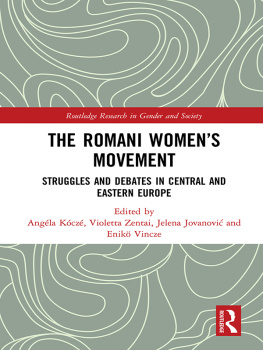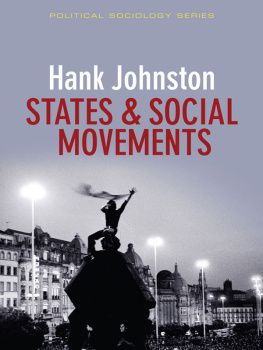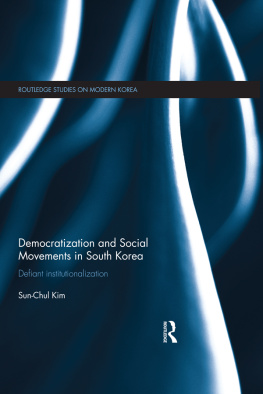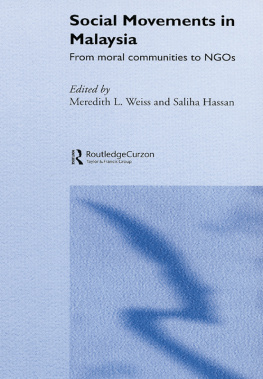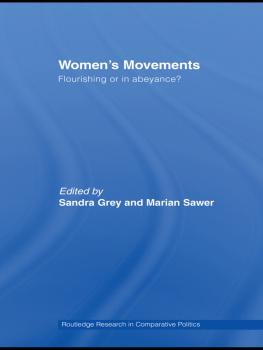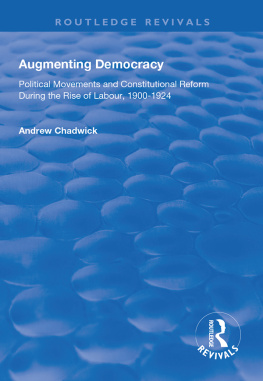History as Performance
This study analyzes history as performance: as the interaction of actors, plays, stages, and enactments. By this, it examines womens politics in Habsburg Galicia around 1900: a Polish woman active in the peasant movement, a Ukrainian feminist, and a Jewish Zionist. It shows how the movements constructed essentialistically regarded collectives, experience as a medially comprehensible form of credibility, and a historically based inevitability of change, and legitimized participation and intervention through social policy and educational practices. Traits shared by the movements included the claim to interpretive sovereignty, the ritualization of participation, and the establishment of truths about past and future.
Dietlind Hchtker is Professor for Historical Transregional Studies at Vienna University.
Routledge Studies in Cultural History
87 Russias French Connection
A History of the Lasting French Imprint on Russian Culture
Adam Coker
88 Transatlantic Encounters in History of Education
Translations and Trajectories from a German-American Perspective
Edited by Fanny Isensee, Andreas Oberdorf, and Daniel Tpper
89 The Humanities in Transition from Postmodernism into the Digital Age
Nigel A. Raab
90 Negotiating Memory from the Romans to the Twenty-First Century
Damnatio Memoriae
Edited by ivind Fuglerud, Kjersti Larsen, and Marina Prusac-Lindhagen
91 Cultures and Practices of Coexistence from the Thirteenth Through the Seventeenth Centuries
Multi-Ethnic Cities in the Mediterranean World, Volume 1
Edited by Marco Folin and Antonio Musarra
92 Controversial Heritage and Divided Memories from the Nineteenth Through the Twentieth Centuries
Multi-Ethnic Cities in the Mediterranean World, Volume 2
Edited by Marco Folin and Heleni Porfyriou
93 History as Performance
Political Movements in Galicia Around 1900
Dietlind Hchtker
For more information about this series, please visit: https://www.routledge.com/Routledge-Studies-in-Cultural-History/book-series/SE0367
History as Performance
Political Movements in Galicia Around 1900
Dietlind Hchtker
TRANSLATED BY CHRIS ABBEY
First published in English 2021
by Routledge
52 Vanderbilt Avenue, New York, NY 10017
and by Routledge
2 Park Square, Milton Park, Abingdon, Oxon, OX14 4RN
Routledge is an imprint of the Taylor & Francis Group, an informa business
2021 Taylor & Francis
The right of Dietlind Hchtker to be identified as author of this work has been asserted in accordance with sections 77 and 78 of the Copyright, Designs and Patents Act 1988.
All rights reserved. No part of this book may be reprinted or reproduced or utilised in any form or by any electronic, mechanical, or other means, now known or hereafter invented, including photocopying and recording, or in any information storage or retrieval system, without permission in writing from the publishers.
Trademark notice: Product or corporate names may be trademarks or registered trademarks, and are used only for identification and explanation without intent to infringe.
Published in German as Geschichte als Performance. Politische Bewegungen in Galizien um 1900 by Campus Verlag (2014).
Library of Congress Cataloging-in-Publication Data
Names: Huchtker, Dietlind, author.
Title: History as performance : political movements in Galicia around 1900 / Dietlind Huchtker ; translated by Chris Abbey.
Other titles: Geschichte als Performance. English
Description: First edition. | New York : Routledge Taylor & Francis Group, 2021. | Series: Routledge studies in cultural history ; 93 | Includes bibliographical references and index.
Identifiers: LCCN 2020026053 (print) | LCCN 2020026054 (ebook) | ISBN 9780367545710 (hardback) | ISBN 9781003089759 (ebook) | ISBN 9781000175608 (adobe pdf) | ISBN 9781000175639 (mobi) | ISBN 9781000175660 (epub)
Subjects: LCSH: Galicia (Poland and Ukraine)Politics and government19th century. | Galicia (Poland and Ukraine)History19th century. | WomenPolitical activityGalicia (Poland and Ukraine) | FeminismGalicia (Poland and Ukraine)History19th century. | Social movementsGalicia (Poland and Ukraine)History19th century. | Peasant uprisingsGalicia (Poland and Ukraine)
Classification: LCC DK4600.G3475 H8313 2021 (print) | LCC DK4600.G3475 (ebook) | DDC 322.4082/094779dc23
LC record available at https://lccn.loc.gov/2020026053
LC ebook record available at https://lccn.loc.gov/2020026054
ISBN: 978-0-367-54571-0 (hbk)
ISBN: 978-1-003-08975-9 (ebk)
Typeset in Sabon
by codeMantra
Contents
This book is a translation of my habilitation thesis published in 2014. I would especially like to thank Michael G. Mller for discussions and encouragement spanning many years. My thanks to Chris Abbey for his translation as well as Laura Loew for proofreading and copy editing. The Campus publishing house generously allowed the book to be re-published in English, and I am indebted to Max Novick from academic publisher Routledge for his patience and persistence. Moreover, I am most grateful to Christian Lbke, director of the Leibniz Institute for the History and Culture of Eastern Europe, for approving the translation, which the German Federal Ministry of Education and Research kindly funded.
Dietlind Hchtker
Berlin, February 2020
AHMTArchiv der Hochschule fr Musik und Theater Felix Mendelssohn Bartholdy (Archive of Felix Mendelssohn Bartholdy University of Music and Theatre), LeipzigAOBArchiwum Odon Bujwid (Odon Bujwid Archive), KrakwBJBiblioteka Jagielloska (Jagiellonian Library), KrakwBNBiblioteka Narodowa (National Library of Poland), WarsawBOBiblioteka Ossolineum (Ossolineum Library), WrocawBSLvivska nacionalna naukova biblioteka Ukrany imeni V. Stefanyka (Stefanyk National Science Library, Lviv)CDIACentralnyj deravnyj istorynyj archiv Ukrany (Central State Archives of Ukraine), LvivCZACentral Zionist Archives, JerusalemIlInstytut literatury im. T. H. evenka nacionalna akademija nauk Ukrany (T. H. evenko Institute of Literature of the National Academy of Sciences of Ukraine), KievPAN KRAKWPolska Akademia Nauk (Polish Academy of Sciences), KrakwPAN WARSZAWAPolska Akademia Nauk, Instytut literacki (Polish Academy of Sciences, Institute of Literature), WarsawPNPPamtnk nrodnho psemnictv (Monument of National Literature), Prague
We tell ourselves that Lemberg, Lopol, Lvov, Lviv, and Lww are all different names for the same city but in fact each is a distinct city of its own, with very precise rules of transition from one to the other.experiences other dimensions of reality. He is forced to acknowledge the limited scope of mathematical laws, their confines imposed by other rules, emotions, interests, and natural events.
The characters in Pynchons novel walk, ride on horseback, and fly by airship between the 1893 Worlds Fair in Chicago and the years shortly after the First World War, between Colorado, Europe, and Siberia. They experience and observe the different perceptions and interpretations of history, including the exclusivity people attach to their own views and the parallelism of different exclusivities. They consider the search for laws and accept their interpretations, the importance of social bonds and their violent destruction, the failure of goals and ideas, and the changes that nevertheless occur. The novel could be read as a search for the rules of change, rules governing the numerous transitions from one place and time to another. For example, the different names of the city of Lviv in the PolishLithuanian Commonwealth, in the Austrian partition, in the Habsburg crownland of Galicia, in the Jewish diaspora, in the eras of Russian and Soviet rule, in Western Ukraine, and in the southeast of the Second Polish Republic are more than mere translations. In fact, various names engender different geographical and temporal reference spaces with successive, opposing, mutually exclusive, and overlapping political and historical narratives. Switching between times, spaces, and histories is not easy; it entails knowing the rules, to say nothing of formulating and breaking them. Well, just as


